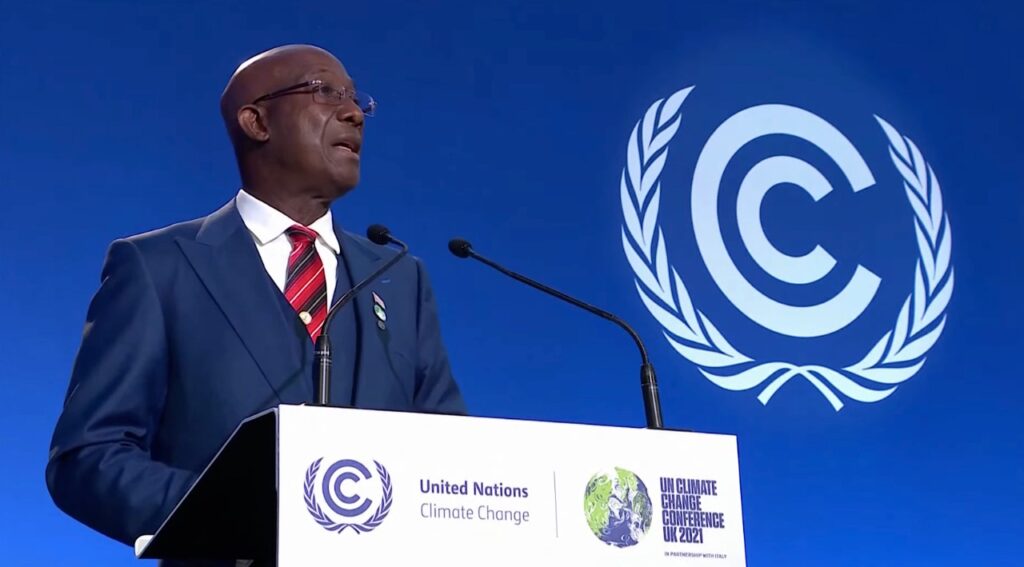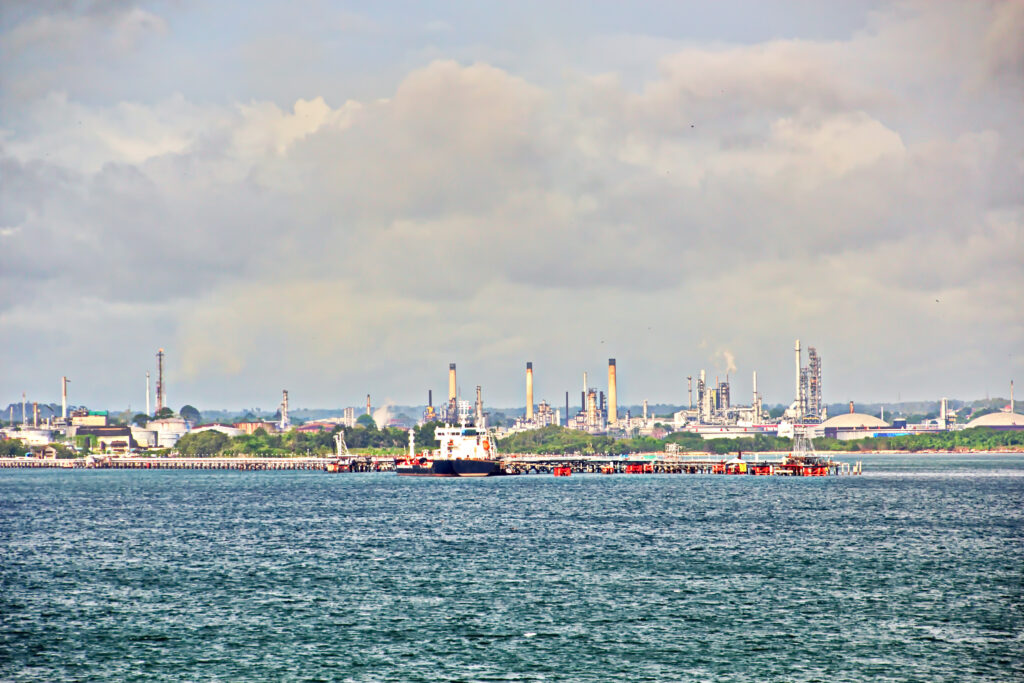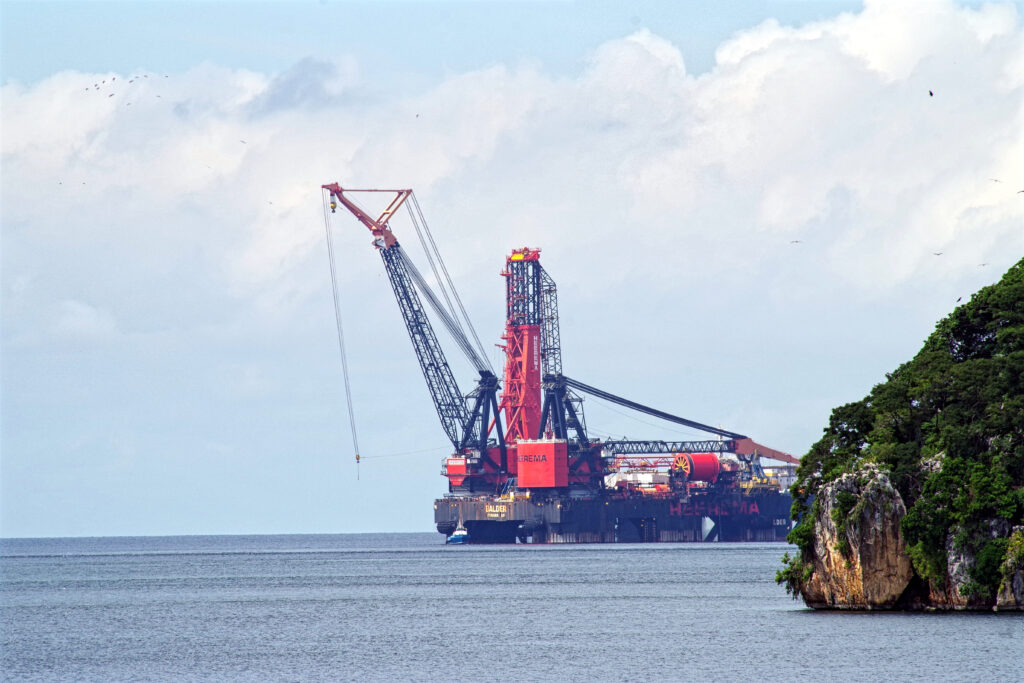

Prime Minister Keith Rowley hinted at the difficulty of the task ahead in his remarks at the COP26 climate conference late last year in Glasgow, Scotland.
“As an economy largely based on oil and gas and petrochemicals, we in Trinidad and Tobago recognize our responsibility in transitioning, over reasonable and manageable time, to net zero,” he said.
Rowley reaffirmed his country’s commitment and determination to do its part, noting that the effects of climate change have already reached the shores of Trinidad and Tobago. “Loss and damage are already clear in the aggressive erosion of our coastline and the bleaching of our coral reefs,” he said. Vulnerable countries need access to climate finance to adapt to the impacts and “assist in transforming their economies to more sustainable, low-carbon paths,” he said.

Prime Minister Keith Rowley speaks at COP26 in Glasgow.
“We have set very ambitious targets aimed at diversifying our economy,” Rowley told his fellow world leaders. “We have embarked upon ambitious plans to reduce emissions and build climate resilience, but we will need help.”
He outlined some of the steps his country has been taking:
At a press conference upon his return to Port of Spain, Rowley stressed that the world needs to transition to more sustainable types of energy and that “change will come” to Trinidad and Tobago as a result. But, he said, that won’t happen overnight.
“We are in the business of hydrocarbons and will remain there as long as there is a market in the world,” he said, noting that production and exploration will continue. He pointed out that bigger producers such as the United States, Australia, and China have not expressed any intention to get out of oil and gas.
In November, Trinidad and Tobago signed a production-sharing contract with Shell to develop the Manatee gas field in the waters between the twin-island nation and Venezuela.
Both Prime Minister Rowley and Minister of Energy Stuart Young have emphasized that natural gas—the main driver of the industry in Trinidad and Tobago—is cleaner than coal and oil, and therefore likely to remain integral to the global economy for a longer time.
At an energy forum in November, Young assured stakeholders that the industry will still be around for decades, the local newspaper Newsday reported. “I understand your concern but my advice is let’s not panic. Let us do what is necessary,” he was quoted as saying.
Rowley and Young have taken pains to emphasize that the country plans to develop more renewable energy resources and to make its petrochemical industry greener. As Prime Minister Rowley said at the news conference after COP26, “The future of the country is at stake here.”
In fact, fossil fuels represent a huge portion of Trinidad and Tobago’s economy. According to the government publication Vision 2030 National Development Strategy 2016-2030, exports of oil, gas, and petrochemicals account for 40% of government revenue, more than 80% of export earnings, and over a third of GDP.

Trinidad and Tobago is a small island state with an industrial economy.
The energy transition is a topic of debate in the country, at least in the energy sector, but so far, the debate is asymmetrical, according to Curtis Boodoo, an energy expert at the University of Trinidad and Tobago (UTT).
“I wouldn’t say that it’s about renewable energy versus oil and gas, because the renewable energy voice is a very small, quiet whisper,” he said in an interview.
As he sees it, the way forward is to “be aggressive” in moving toward the energy transition. It’s not about closing down the country’s largest industries, he explained, but about adapting them and building on the know-how accumulated over more than a century of petroleum production.
“I think we’re at a crossroads,” said Boodoo, an electrical engineer by training who teaches at UTT and has been a consultant on energy-related projects both for the government and for international agencies. “We have the opportunity to choose to embrace the transition. The time to choose to embrace the transition is now.”
In some cases, he said, having a large oil and gas sector even gives the country an advantage. Take offshore wind, for example. The state-owned National Gas Company is working with UTT on a preliminary study to explore the potential for developing this source of renewable energy, which could support the greening of the petrochemical industry.
The country’s petrochemical plants currently use so-called gray hydrogen (produced from natural gas) as a feedstock. If they could use green hydrogen instead (produced from renewable energy), that would make exports like ammonia and methanol more valuable on the global market.

A drilling platform awaits customs clearance in port before being taken to an oil and gas field offshore.
Offshore wind would be a “natural fit” as a renewable energy source for industry, according to Boodoo, in part because there is already a network of Trinidadian companies in place that service offshore rigs and platforms and that could pivot to the new technology. He argued for investing in offshore wind while offshore gas production is still active and before people start to leave the industry.
“The infrastructure to embrace the transition is there, the local technical expertise is there. We just need some hard, solid decisions to be made, that this is the direction we’re going,” Boodoo said.
As a starting point, he would like to see the government set a target date—preferably 2050— for Trinidad and Tobago to reach net zero, as some of the country’s Caribbean neighbors and many of the world’s largest economies have done. “By doing that, we force ourselves to be aggressive in our transition,” he said.
Of course, governments are not alone in looking at an energy transition. The utility-scale solar project that Prime Minister Rowley mentioned in Glasgow is slated to be built by a consortium that includes BP and Shell, two companies that are already big players in Trinidad and Tobago’s petroleum industry and that have touted their own transition strategies.
The new project, which could get underway this year, will consist of solar farms in two locations on the island of Trinidad, with a combined capacity of 112 MW. Rowley said in Glasgow that the government plans to increase its reliance on solar power in the coming years, to 30% of capacity by 2030.
Boodoo believes that for solar power to really take off, Trinidad and Tobago must adopt a feed-in tariff to allow for generation of electricity for domestic and commercial purposes—rooftop solar, in other words. Solar farms take up a lot of room and space is limited, he noted, adding that the solar project in the works will take up more than three times the area of Queen’s Park Savannah, Port of Spain’s largest open space.
Today, Trinidad and Tobago’s electricity comes from natural gas, and it is far cheaper and cleaner than in other Caribbean countries that still use diesel or fuel oil for power generation. Some argue that rates should go up to encourage conservation, and Boodoo agrees that an increase is due; however, he does not think it makes sense to raise rates drastically.
“We are blessed with an indigenous source of natural gas,” he said, adding that major investments have been made to build an efficient system for electricity generation so that people can benefit from the resource that powers so much of the economy.
“The people of Trinidad and Tobago invested quite a lot of resources into our natural gas economy and our power sector,” he said. “This is one of the reasons why electricity is cheap.”
 View Map
View Map